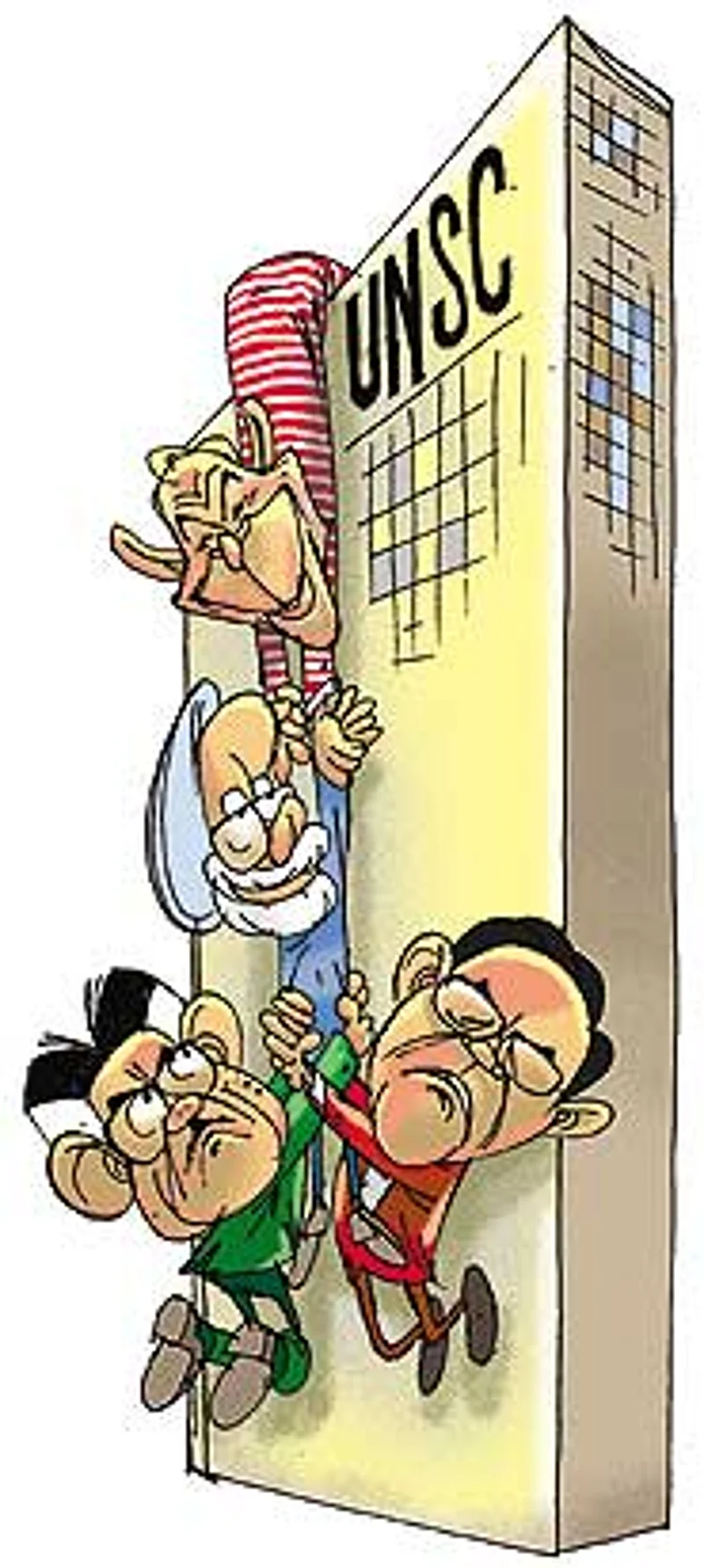Gazing at the crystal ball of tomorrow's geopolitics and with today's concrete realities in mind, the Bush administration has signaled initial support for India's aspirations for a permanent seat in the United Nations Security Council (UNSC). Senior US officials told foreign secretary Shyam Saran last week that they accept the need for UN reform, expansion of the Security Council and accommodating India within international organisations (a euphemism for the United Nations). Long, hard hours of diplomatic negotiations remain before the final vote but Washington is significantly warm and getting warmer with each visit.
Saran's discussions with Philip Zelikow, senior adviser to secretary of state Condoleezza Rice and a key player in US policy on South Asia, and Nicholas Burns, undersecretary of state for political affairs, clarified the forward-looking US position, giving hope although not yet salvation. President George Bush may well articulate US support for India's bid during Prime Minister Manmohan Singh's visit in July, say key officials. Shirin Tahir-Kheli, adviser to Rice on UN reform, will visit India in June to discuss the issue, making New Delhi the first of a very few stops. The US would like to push widespread reforms within the UN and not just the expansion of the UNSC. The challenge for India is to demonstrate that it is not merely interested in a permanent seat but holds a larger vision, and engage Washington in intensive discussions.
Delhi was concerned about a statement by Tahir-Kheli, a Pakistani American, who told the UN General Assembly in April that the US supports UNSC reform on the basis of "broad consensus and without artificial deadlines". This was taken by many as a recipe for inaction and a position too close to China's wrecking ball currently trying to demolish the reform campaign. Last week, senior US officials made it clear they were not with China in the sabotage mission. Washington is not yet actively campaigning for or against any country but its leanings are fairly clear. It supports Japan, favours India, opposes Germany and is indifferent to Brazil.
China's reactions have bordered on the hysterical. Its response to the first real step in the expansion of the UNSC—the circulation of a draft resolution by India, Japan, Germany and Brazil who have joined forces as the G-4—was hyper negative. A day after the G-4 circulated the draft resolution on May 16, Chinese foreign ministry spokesman Kong Quan was foaming about how the resolution was "detrimental" to the reform process. "To take such a move hastily will only intensify contradictions," he said, according to the People's Daily.
The G-4 resolution recommends expanding the Security Council from 15 to 25 with six new permanent members with veto power and four new non-permanent members. It posts a clear time-table for tabling the resolution in June, election in mid-July and amendment of the UN charter thereafter. All resolutions would be subject to a two-thirds majority—128 of the 191 member countries, a test that Saran said India will willingly take.
Differences among the G-4 on veto power were overcome to present a united front. Germany and Japan wanted to go soft on the veto demand with Brazil taking a somewhat wobbly position. It was India, supported by a number of African countries, that felt strongly that new members must have the same powers. "We are firm on the juridical right of veto given under the UN charter," said India's UN representative Nirupam Sen. "We will determine concretely the views of the developing countries on the practical exercise of this right." Proposals on veto use by new members range from allowing them to use it only under certain circumstances to activating the veto at a specified later date.

While China's driving ambition is to block Japan's candidacy, its attitude towards India's membership is not exactly bursting with enthusiasm, big noises about an India-China strategic partnership notwithstanding. In fact, China is identified with the negative agenda of the so-called "coffee club", the sole purpose of which is to block UNSC expansion. Coffee club members are opposed to specific countries being included—Pakistan, one of the club's founding members, opposes India's bid, Mexico and Argentina oppose Brazil, Italy and Spain are against Germany's inclusion and South Korea and China are against Japan. While Italy bankrolls the dinners, the strategy often comes from Pakistan. Munir Akram, Pakistan's top diplomat in New York, is a man known for using every procedural trick to block, subvert and colour India's agenda. The peace process hasn't hit New York yet.
Sources say that Pakistan is launching a campaign against the G-4 resolution by sending envoys to various capitals who will argue for Model B—no new permanent seats but eight temporary four-year seats divided among different regions. Naseem Zehra, a pro-military Pakistani security expert, is reportedly being recruited by her government to visit Canada, Cuba and Mexico to argue against the G-4 campaign. The coffee club regulars were caught offguard because they were "banking on the G-4 resolution dying a slow death", said a diplomatic source. But the resolution already has more than 50 co-sponsors with a good chance of some permanent members joining in.
As the summer unfolds, so will diplomatic games with endless rounds of secret meetings, lavish receptions and private dinners. Governments will dangle trade deals, twist arms, exert pressure, issue threats and use all others means to garner votes. Spoilers have to get only 62 votes to block the G-4. Rules say that abstentions and absence will both count as "No"—a coffee club trick. If ambassadors are suddenly found visiting the men's room at voting time, you will know the "coffee" got to them. But the choice is theirs—the old order or a new one?





















